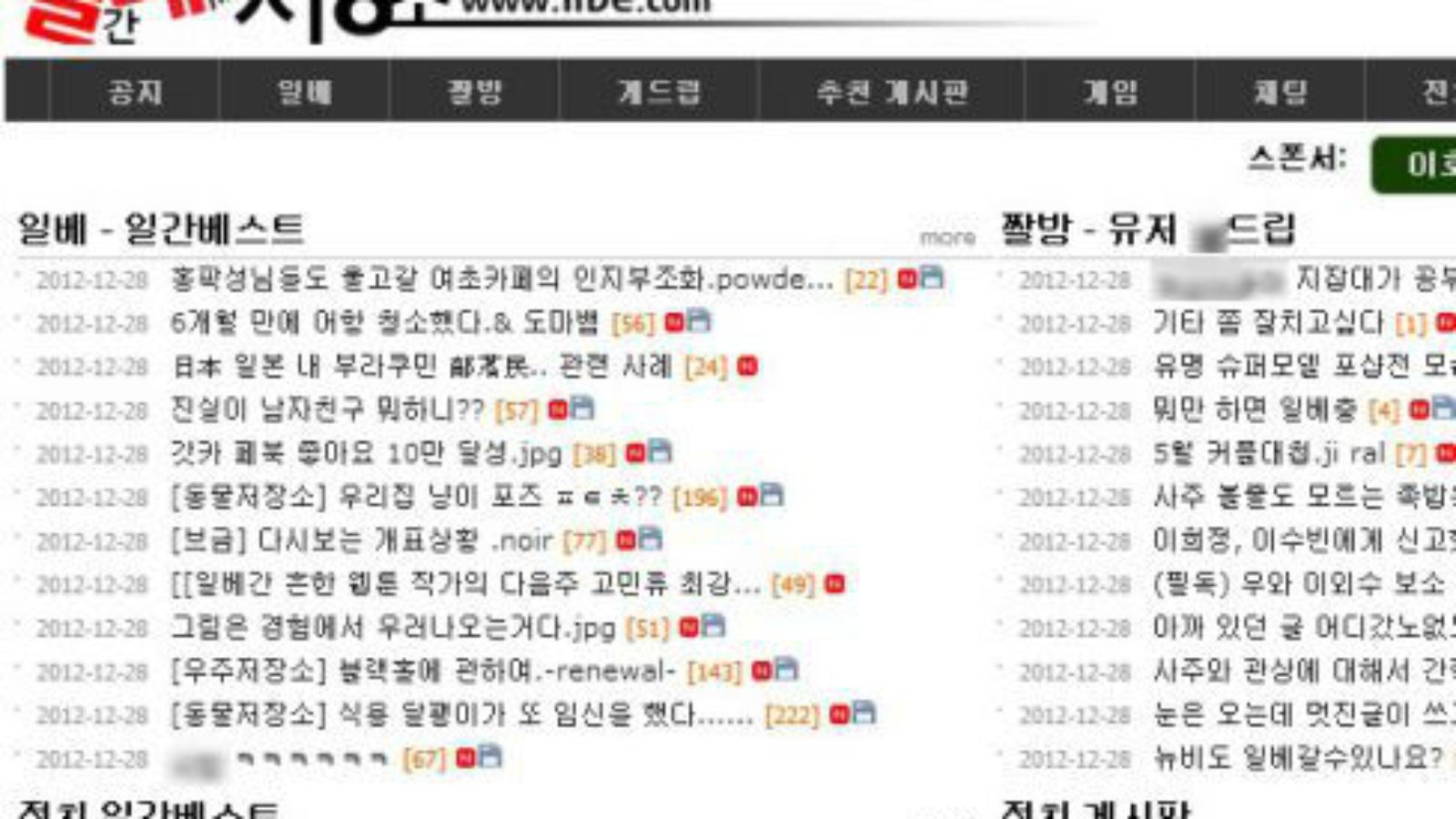By Eunsun Cho
In April 2014, only a few days after a ferry tragically capsized in South Korea, a young man in his twenties was arrested for sexually insulting victims of the accident online. In September 2014, two months after families of the victims initiated a hunger strike in Gwanghwamun Square, dozens of youths mocked them by hosting a pizza party then proceeding to take selfies while devouring food directly in front of their faces. The offenders in both incidents organized their activities via the online extreme-right wing website known as Ilbe.
Though Ilbe was not known to many before, the community became a household name in Korean politics after the events in Gwanghwamun Square. To Western internet users, Ilbe bears a resemblance to Reddit, but with a more venomous population of cultural trolls. The website’s popularity and influence among the South Korean youth makes its growth especially worrisome. In turn, the South Korean right-wing has a vital role to play in rejecting Ilbe’s attempt to identify itself with mainstream conservatism, as it is the responsibility of any modern society to draw firm lines between the expression of serious ideas and sophomoric provocation that toys with extremism.
The exact timeline of Ilbe’s development remains vague. According to various reports, it launched between 2009 and 2010 as a website devoted to hosting humorous stories and pictures. In more recent years, however, Ilbe has devolved into an outright anti-communist, anti-immigrant, and misogynist forum.
By 2012, Ilbe had attracted one million members, with an estimated growth into 2 million followers this year. Given the problematic messages that populate the website, it’s surprising that its members so often hail from renowned universities or prominent companies. After the ferry incident, and the political disputes that followed, nation-wide feelings of confusion, frustration, and distrust provided Ilbe a chance to make an impact in the offline world.
The website’s subsequent success signals several troubling features of South Korean society. Although few people may express their ideas in such offensive contexts, anti-communist, anti-immigrant, and misogynist stances are all too common. The historical rivalry between North and South Korea, paired with North Korea’s incessant military aggressions, have stigmatized leftist political expression in South Korea. Often, these stigmas arise in accusations of leftists being sympathetic to communism.
The growing immigrant population in South Korea has also intensified xenophobic sentiment. Despite the presence of policies and campaigns supporting cultural diversity, many South Koreans view immigrants as dangerous and undeserving of equal rights. The longstanding identity of a ‘one-race’ nation only serves to contribute further to the anti-immigrant attitudes.
Moreover, a palpable backlash of cultural misogyny against South Korea’s movement toward gender equality continues to circulate. Although great strides have been made towards greater female participation in all walks of South Korean life, the traditional notion that women should sacrifice themselves for husband and family still remains. As many Ilbe members echo anonymously, frustration with the mandatory conscription of all male citizens and the elevated social expectations placed on men has provoked a certain surge of resentment among the young male population towards their female counterparts. As the number of both the website’s users and audience grows, Ilbe gains momentum in further provoking and magnifying these attitudes.
One of the ways Ilbe desensitizes their audience towards the violence of their expressions is through a taboo-prodding sense of humor. As on Reddit, posts on Ilbe that earn the greatest number of votes from other users are selected as the ‘best’ story of the day. The anonymity of the Internet and the website’s lax rules on personal identification remove boundaries on how Ilbe users express their humor or what they can mock. These shields of humor and anonymity give members a nearly untethered sense of their freedom of speech, while the competition within the network motivates them to be as creative—and subsequently offensive—in their expressions as possible.
As Ilbe members bring these esoteric yet plainly defamatory slurs to other online communities, new groups of Internet users quickly adopt their language without necessarily grasping the full scope of its meaning. For example, in 2013, members of the pop group Crayon Pop apologized after mistakenly tweeting words that Ilbe members coined to ridicule the death of a former President. One of Ilbe’s ‘best’ posts boasts that, thanks to their “talent” to be “fun to imitate,” their influence on Internet users remains elusive but powerful. In this way, some of Ilbe’s rhetoric merges into the public opinion in the online sphere.
Last year, Saenuri, the current governing right wing party of South Korea, appointed Sung-San Jung, a staunch supporter of Ilbe to a senior position in its ranks. Mr. Jung has funded Ilbe’s mockery of the families at Gwanghwamun Square and has made racist comments about Jasmine Lee, a Philippine-born naturalized Korean congresswoman of Saenuri. While criticizing Ilbe’s “lowbrow” culture, Congressman Tae-Kyung Ha of Saenuri characterized Ilbe as “a promising group of young conservatives” who “[know] right and wrong.”
If the right wing fails to distinguish themselves from toxic communities like Ilbe, its growing influence will eventually dampen Saenuri’s own commitment to promoting gender equality and cultural diversity. As South Korean journalist Gwan-Yul Chun warned, “[u]nlike some conservatives’ expectation, there is no way to strip off extremism from Ilbe” and call it conservatism.
*****
*****
Eunsun Cho is an editorial assistant at World Policy Journal.
[Photo Courtesy of Yonhap News Agency]